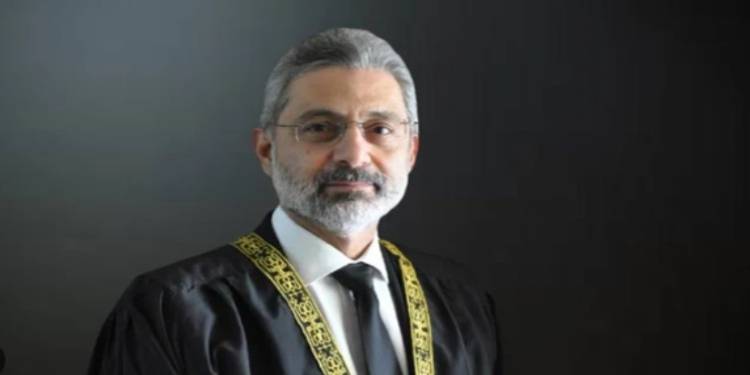
Justice Qazi Faez Isa has said that the constitution grants the Supreme Court (SC) as a whole the authority to take suo motu notice, adding that this authority does not exclusively rest with the Chief Justice of Pakistan (CJP).
He said this while addressing a ceremony honoring the Constitution's golden anniversary. Justice Isa, who will take over as CJP in September, was questioned about the conflicting views on the top judge's suo motu authority during the occasion.
It is pertinent to mention here that on March 29, Justice Isa and Justice Aminuddin Khan issued a ruling stating that the CJP lacked the authority to create special benches or choose its members. They also ordered that all hearings based on suo motu notices and cases with significant constitutional implications be postponed until they were addressed by legislation. The order was eventually recalled, though, by a larger bench of six judges earlier this month.
Justice Isa said, "The SC in Article 184(3) means that all judges and the chief justice unanimously take suo motu notice."
"In my view, when the court meets, you refer to it as the SC, because Article 184(3) begins with the phrase "Supreme Court." The Chief Justice and Senior Puisne Judge are not mentioned. In my view, the SC is the only party with this privilege."
The SC's original jurisdiction is outlined in Article 184(3) of the Constitution, which also gives it the authority to assume jurisdiction over cases involving a subject of "public importance" pertaining to the "enforcement of any of the fundamental rights" of Pakistani citizens.
Justice Isa's comments come as the controversy over the CJP's suo motu powers has heated up recently. The Parliament has also approved a bill that would strip the CJP's office of its ability to take suo motu notice in an individual capacity.
However, a larger bench led by CJP Umar Ata Bandial has suspended the bill, which has not yet become law.
He said this while addressing a ceremony honoring the Constitution's golden anniversary. Justice Isa, who will take over as CJP in September, was questioned about the conflicting views on the top judge's suo motu authority during the occasion.
It is pertinent to mention here that on March 29, Justice Isa and Justice Aminuddin Khan issued a ruling stating that the CJP lacked the authority to create special benches or choose its members. They also ordered that all hearings based on suo motu notices and cases with significant constitutional implications be postponed until they were addressed by legislation. The order was eventually recalled, though, by a larger bench of six judges earlier this month.
Justice Isa said, "The SC in Article 184(3) means that all judges and the chief justice unanimously take suo motu notice."
"In my view, when the court meets, you refer to it as the SC, because Article 184(3) begins with the phrase "Supreme Court." The Chief Justice and Senior Puisne Judge are not mentioned. In my view, the SC is the only party with this privilege."
The SC's original jurisdiction is outlined in Article 184(3) of the Constitution, which also gives it the authority to assume jurisdiction over cases involving a subject of "public importance" pertaining to the "enforcement of any of the fundamental rights" of Pakistani citizens.
Justice Isa's comments come as the controversy over the CJP's suo motu powers has heated up recently. The Parliament has also approved a bill that would strip the CJP's office of its ability to take suo motu notice in an individual capacity.
However, a larger bench led by CJP Umar Ata Bandial has suspended the bill, which has not yet become law.

